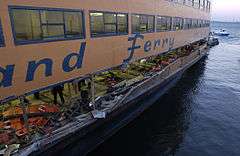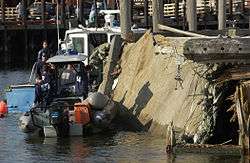2003 Staten Island Ferry crash
 Damage to the ferry after the crash | |
| Date | 15 October 2003 |
|---|---|
| Time | 3:21 p.m. (EST) |
| Location | St. George, Staten Island |
| Cause | Pilot impairment |
| Deaths | 11 |
| Non-fatal injuries | 165 |
| Convicted | Pilot Richard Smith and New York City ferry director Patrick Ryan |
| Charges | Manslaughter, Making false statements |
| Verdict | Guilty pleas |
| Convictions | 18 months (Smith), a year and a day (Ryan) |
| On board | ~1,500 |
On October 15, 2003, at 3:21 p.m., the Staten Island Ferry vessel Andrew J. Barberi crashed full-speed into a concrete pier at the St. George ferry terminal. Eleven people were killed and 165 injured, some critically.[1]
Accident
The 310-foot (94 m) ferry was at the end of its 5-mile (8 km), twenty-five-minute trip from Manhattan to St. George, Staten Island. On board were approximately 1,500 passengers, well below the maximum capacity of 6,000. Winds were particularly heavy that afternoon, with gusts of more than 40 mph (64 km/h). The water in New York Harbor was described as "very choppy".
Instead of docking, the ferry angled away from its berth and slammed full-speed into a maintenance pier, a concrete platform supported by pilings. The pier ripped into the ferry's starboard side and tore into the boat's main deck where many passengers were crowding forward to disembark. As the concrete slab entered the boat, passengers screamed and ran for cover. Some jumped into the water. The accident left a number of victims trapped in a pile of metal, glass, and splintered wood.[2] The accident was the worst in the ferry service's 98-year history. The ferry's hull, however, sustained no damage, and the vessel was never in danger of sinking.
On the upper deck, passengers waiting to exit turned and ran in panic as the ferry struck the pier. Following the crash, they could see none of the carnage immediately below them. No announcements were made, and the upper-deck crowd waited in ignorance for twenty minutes, until the vessel was turned around and finally docked at the other end. Even before it reached its berth, rescue workers arrived on shore to assist with the search for survivors.
Fatalities and injuries
Eleven people were killed and 71 others injured in the accident. All the fatalities and most of the injuries were to passengers on the main deck; some passengers on the upper decks were injured during the crowd's panic, and many were treated for shock. The deaths included a survivor of the September 11 attacks and a woman who was placed in a drug-induced coma for two months after the accident. Paul Esposito, a 24-year-old waiter, had both legs severed below the knee. His life was saved by Kerry Griffiths, a sightseeing 34-year-old pediatric nurse from England, who applied tourniquets.[3]
Aftermath

Mayor Michael Bloomberg promptly announced that the crash was an accident, allaying fears of a public still stunned by the 9/11 terrorist attacks, which killed a large number of Staten Island residents. A co-worker claimed to have seen the pilot asleep on duty, slumped over the controls. Two witnesses said the boat seemed to speed up just before the crash.
The ferry's pilot, Richard Smith, attempted suicide by slitting his left wrist while still on the boat. He then slipped away so suddenly that he left his house keys. He was found shortly afterwards at home, having apparently broken in. Smith had again tried to kill himself, this time by shooting himself twice in the chest with a pellet gun, but also survived this second suicide attempt.
It was later determined that Smith had lost consciousness while at the ship's controls. He had taken the painkillers tramadol and Tylenol PM, both of which can cause drowsiness as a side effect. The city rules required two pilots to be present during docking, but this rule had not been enforced by the management of the ferry service, and Smith had been alone in the pilot house.
A total of five people were charged in the U.S. District Court for the Eastern District of New York. Smith was charged with eleven counts of seaman's manslaughter as well making false statements in his medical report when applying to the U.S. Coast Guard for a renewal of his pilot's license. His doctor, William Tursi, was charged for lying on the same report. The city's ferry director, Patrick Ryan, was also charged with seaman's manslaughter and making false statements arising from his failure to enforce the two-pilot rule. Michael J. Gansas, the ferry's captain, was charged with lying to investigators. John Mualdin, the port captain, was charged with obstruction of justice and lying to investigators; he falsely claimed that information regarding the two-pilot rule had been distributed to employees.[4]
On August 4, 2004, Smith pleaded guilty to seaman's manslaughter. He was sentenced to 18 months in prison on January 10, 2006. New York's former city ferry director, Patrick Ryan, who had also pleaded guilty to manslaughter, was sentenced to a year and a day.
The accident resulted in scores of lawsuits against the city. As of September 2008, the city had paid $54.3 million to the victims and their families, with other lawsuits pending.[5]
The crash was at first said by New York City to be an Act of God, with attorneys arguing that the Department of Transportation should not be held responsible for the crash, an argument that disturbed many survivors and New York City residents.[6] City attorneys, citing a 19th-century maritime law, would later argue that the total amount of damages sought against the city should not exceed the cost of the ferryboat. On February 26, 2007, U.S. District Judge Edward Korman rejected this argument and held that the city could not cap damages, writing, "The city's failure to provide a second pilot or otherwise adopt a reasonable practice that addresses the issue of pilot incapacitation was plainly a substantial factor in causing the disaster."
Despite these rulings and a similar, independent federal probation report by officer Tony Garoppolo into the culpability of the ferry service's upper management in which he ruled "the lion's share of culpability in this case as resting with the high level management of the Ferry Service", no other employees of the New York City Department of Transportation were prosecuted.[7]
On May 8, 2010, the same boat was involved in another crash. As the ferry approached the St. George terminal, the throttle failed to engage as it prepared to dock and the boat crashed into the dock. The impact caused 37 injuries, one of which was serious.
References
- ↑ McFadden, Robert D. (October 17, 2003). "Inquiry Centers On Ferry Pilot In Fatal Crash". The New York Times. Retrieved 22 September 2008.
- ↑ English, Simon; Davies, Catriona (16 October 2003). "Passengers feared ferry had been bombed". The Daily Telegraph.
- ↑ Urbina, Ian (October 18, 2003). "'Angel' Meets Victim She Helped Save". The New York Times. Retrieved 22 September 2008.
- ↑ Luo, Michael (5 August 2004). "FERRY DIRECTOR IS CHARGED BY U.S. IN FATAL ACCIDENT". The New York Times. Retrieved 25 January 2017.
- ↑ Newman, Andy (September 17, 2008). "Judge Gives Man Paralyzed in Ferry Crash Highest Award So Far". The New York Times. Archived from the original on 18 July 2011. Retrieved 22 September 2008.
- ↑ "City Cites "Act of God" in Staten Island Crash". Retrieved 19 September 2006.
- ↑ "Bloomberg and Schumer Happy About Ferry Cash, Reminding Us of a Certain Fatal Crash". Archived from the original on 14 August 2009. Retrieved 11 August 2009.
External links
- NYC ferry crash kills 10, injures dozens – Washington Times
- Ferry Pilot Sentenced – Sydney Morning Herald
- Staten Island Angel Memorial – website dedicated to victims of the accident
- SI Ferry Crash- FDNewYork.com